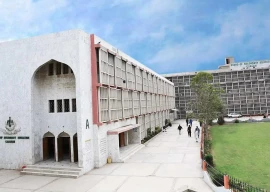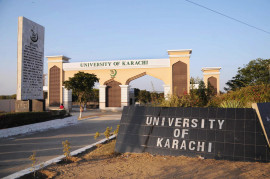
With a new interior minister come new security guidelines for the federal capital, but not much has changed on the ground so far. A few steps have been taken in the right direction, even if they are baby steps.
Chaudhry Nisar Ali Khan, the new interior minister, recently called a meeting of the heads of civil armed forces and the Islamabad police chief to devise a new security policy. As part of the new policy, the new minister, who has assured the people that he means business, decided to remove checkpoints established at the city’s exit points.
The news brought some relief to the people of twin cities of Islamabad and Rawalpindi. But it did not end their misery. The actual nuisance still stands firm. Acting upon the new minister’s first directive, the capital police quickly removed the exit point pickets.
But these 10 checkpoints only represent a handful of the total number. Removing them has only slightly eased commuters’ woes. More than 35 police checkpoints are still harassing people in the name of security.
It was not clear as to why the interior minister stopped short of completely relieving the city of the nuisance. Here, Islamabad’s top cop perhaps prevailed upon him like he did to Khan’s predecessor. The top cop has been able to successfully defend this stupendously failed policing strategy.
“What if we remove the checkpoints and something happens? If it happens I should not be held responsible,” has been the Inspector General of Police’s reply to all those who attempted to get the pickets removed. The recipients of this answer include ministers, the Senate’s standing committee on interior, district government, and a slew of other city officials.
But the past record of terrorists’ strikes in Islamabad shows that the deadliest of them occurred despite the presence of checkpoints --- which used to number over one hundred --- in the city. The pickets even failed to apprehend the militants that blatantly targeted high government and military officials in broad daylight right in the heart of the city.
Still, the police chief persisted with the plan, though the number of such barricades was gradually reduced. The approach served only to divert the police from its actual job and caused great losses in terms of human resources available to fight everyday crimes.
Enhanced police patrolling and better intelligence gathering by the police would have done the job better. But that requires hard work from top to bottom, while pickets only punish lower staff. With that in mind, it is less of a surprise that senior staff went with the latter option.
The interior minister’s other directive was to remove civil armed forces such as Rangers and Frontier Constabulary (FC) from VVIP duty. But not even once did he consider over 6,000 police officials deployed on security duty, compared to just 2,700 available for regular policing. When this virtual brigade of policemen is sent back to reinforce the weakened policing battalions remains to be seen.
Published in The Express Tribune, June 24th, 2013.





1732947071-0/BeFunk_§_]__§-(4)1732947071-0.jpg)











COMMENTS
Comments are moderated and generally will be posted if they are on-topic and not abusive.
For more information, please see our Comments FAQ